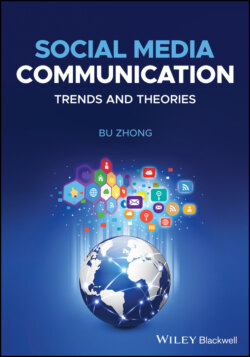Читать книгу Social Media Communication - Bu Zhong - Страница 12
Digitization and Digitalization
ОглавлениеSince the first digital message was sent out from a computer at the University of California in Los Angeles to another at the Stanford Research Institute in Menlo Park, California on October 29, 1969, marking the start of the internet, the world has been significantly transformed by the internet and computer-based technologies, including social media (Zhong, 2020). It is hard to predict the future of social media and how they will advance. Problematic use of social media may be a growing social concern, for example, hate speech or cyberbullying. Social media were not originally designed to protect users from abuse, misinformation, or disinformation. As a result, people will be vulnerable to more harm on social media in the coming decades. These digital nuisances, unfortunately, will keep harassing users for a long time.
Facing the potential perils on social media, users are encouraged to search for solutions for new challenges and overcome them. One of the solutions is to study them. However, the future of social media usage can be exciting, too. There are ample positive effects associated with using them. Many researchers believe that social media usage can change the world for good. It will be interesting to witness how social media-dependent human societies will evolve in coming decades.
What is the future of social media? Niels Bohr, Danish physicist and Nobel Laurate, once said, “It is difficult to predict, especially the future.” However, if we have to predict the future of a social media-dependent human society, people in such a society will universally embrace the trend of digitization and digitalization. The use of social media represents the digital transformation development of social life, a societal process requiring people to prepare, adopt, and integrate digital changes. Meanwhile, people are subject to develop and are confronted with old and new digital models in life and business.
To understand the future of social media, it is useful to define and differentiate digitization and digitalization. Digitization describes the analog-to-digital conversion of existing data and documents, in which the data are not changed in any substantial way, but simply are encoded in a digital format. For example, when an old black-and-white movie is converted to a digital version, the resolution may be improved and even colors can be added, but the movie remains the same movie, just in a digital format. Digitization can reap efficiency benefits when the digitized data are easily circulated and shared over the internet.
In the business world, digitalization is defined as “the use of digital technologies to change a business model and provide new revenue and value-producing opportunities; it is the process of moving to a digital business” (Garner, 2021). In this vein, we define digitalization at the societal level as the use of digital technologies to change human communication and social life, providing new benefits and value-added opportunities for human societies. Thus, digitalization moves beyond digitization (see Table 1.1), leveraging digital information technology to transform social life and business models – evaluating, reengineering, and reimagining the way we live and do business.
Table 1.1 The differences between digitization and digitalization.
| Digitization | Digitalization | |
|---|---|---|
| Definition | Digitization describes the analog-to-digital conversion of existing data and documents, in which the data are not changed in any substantial way but simply are encoded in a digital format. | Digitalization refers to the use of digital technologies to change human communication and social life and provide new benefits and value-added opportunities for human societies. |
| Examples | Converting a black–white movie into a colored one with better resolutionScanning a paper book to a digital bookRecording a live lecture to keep as a digital file | Analyzing Google search results to understand flu season trendsUsing digital tools to monitor the quality of telemedicine visitsUsing analytics tools to study customers’ feedbacks on services |
The synchronization of human communication in real-time through advanced digitalization has transformed our social life since the birth of the internet in 1969, causing a series of epoch-making changes in the current social media-dependent society that is dramatically different from previous eras, like the agricultural and industrial ages. In the coming decades, we should see a growing integration of multiple technologies into various aspects of our societies that will be increasingly digital. Some examples of digitalization include: smart homes, e-learning, e-healthcare, smart mobility, and smart cities, which are largely powered by computer-based technology, including information science and mobile technology.
Many domains will benefit from digitalization; cultural artifacts like artwork and historical relics can be digitized and therefore preserved and shown to the public, even if they are stolen, damaged, or are just not conveniently accessible. As more and more information and data are easily shared and accessed due to digitalization, more knowledge can be shared and produced like never before, adding new values to human societies. The widespread impact of digitalization affects everything from interpersonal communication and relationships augmented by social media and their services, to other relationships, such as how citizens interact with support services in e-government. Both digitization and digitalization are critical to the digital transformation of our social life. It is important to note that the process of digital transformation is not about data or information, but it is about people. The use of social media represents a key component of digital transformation, which in turn will define the future of social media, a topic we will revisit in the last chapter.
